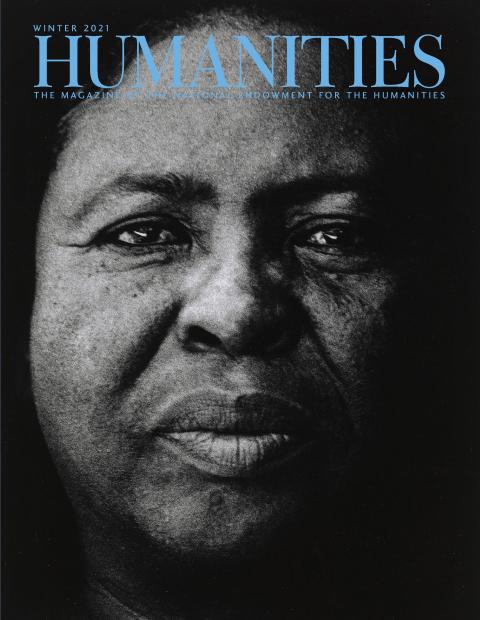The humanities, however vast and diverse they may be, usually have one thing in common: They begin a step or two behind the present. They are not news or current events.
This notion, usually a help to those called on to define the humanities, has been turned upside down in the past year as the long history of racial injustice in America has been brought to bear on current questions of policy and politics.
The past is now. And the sunny mood of progress that comes so naturally to us Americans has been overtaken by a heavy season of self-examination as we look at those times we failed to ensure the safety and rights of our fellow Americans, particularly Black Americans.
Fannie Lou Hamer traveled on a bus in 1962 with some friends and neighbors to Indianola, Mississippi, to register to vote. For this she lost her job. For encouraging others to vote, she was imprisoned and beaten. As Rosalind Early makes clear in this issue, torture is not too strong a word for what Fannie Lou Hamer endured.
By 1971, when Louis Draper photographed her, Hamer was an elder stateswoman of the movement to salvage and protect the civil rights of African Americans. Draper was not your typical magazine photographer. Artistically, he was a descendant of Dorothea Lange and W. Eugene Smith, as Erina Duganne, who once interviewed Draper, makes clear in her essay.
In one of many great poems collected in the new Library of America volume, African American Poetry: 250 Years of Struggle & Song, Langston Hughes riffs on Walt Whitman.
“I, too, sing America,” wrote Hughes. “I am the darker brother / They send me to eat in the kitchen / When company comes.”
NEH supported the Library of America volume—edited by Kevin Young, who is interviewed in this issue—as it has many other projects in African-American history and letters, including the papers of W.E.B. DuBois.
A century ago, DuBois wrote his own crestfallen rejoinder to the optimism of an earlier time. Called Darkwater, it was created in the aftermath of World War I when DuBois realized he had been wrong about the war and wrong to expect that Black patriotism would be justly rewarded. Like The Souls of Black Folk, it fused elements of storytelling, social criticism, and scholarly perspective. Chad Williams takes us through this important book by a great American thinker.
After World War I, American society was convulsed by a series of so-called race riots, including, one hundred years ago this spring, the massacre of a storied Black community in Tulsa, Oklahoma—a vicious episode recounted in this issue by Kweku Larry Crowe and Thabiti Lewis.
Also in these pages, you can find stories about the travels of Zora Neale Hurston, Maya Angelou’s partnership with Hallmark, and the legacy of William Lanson.
Thanks especially to our NEH colleagues Beauty Bragg and Mary Downs for contributing ideas to this and other recent issues of Humanities.

